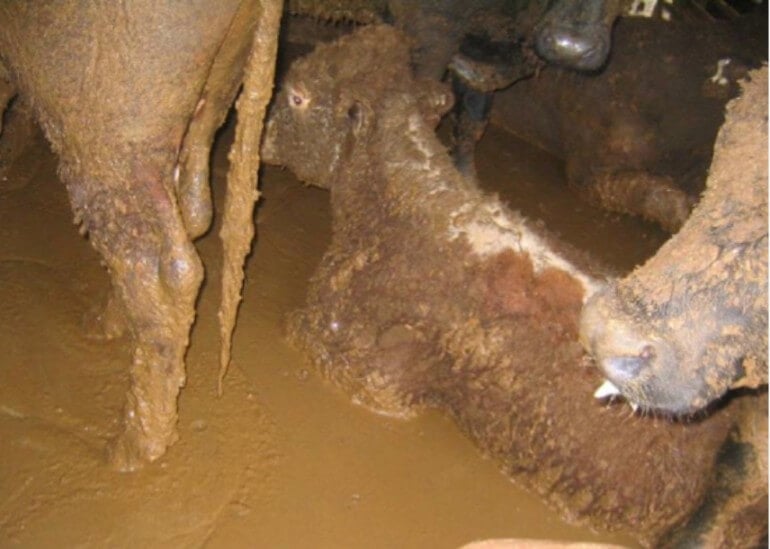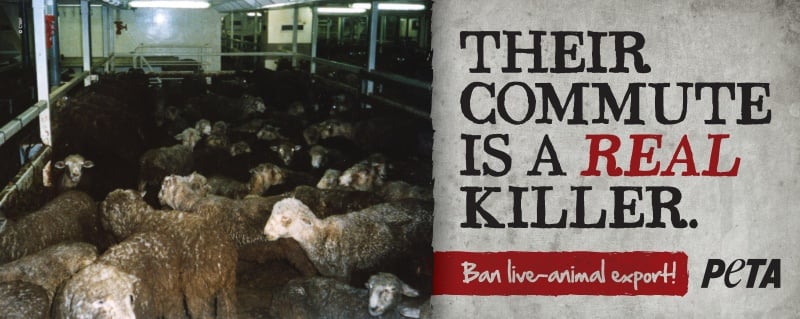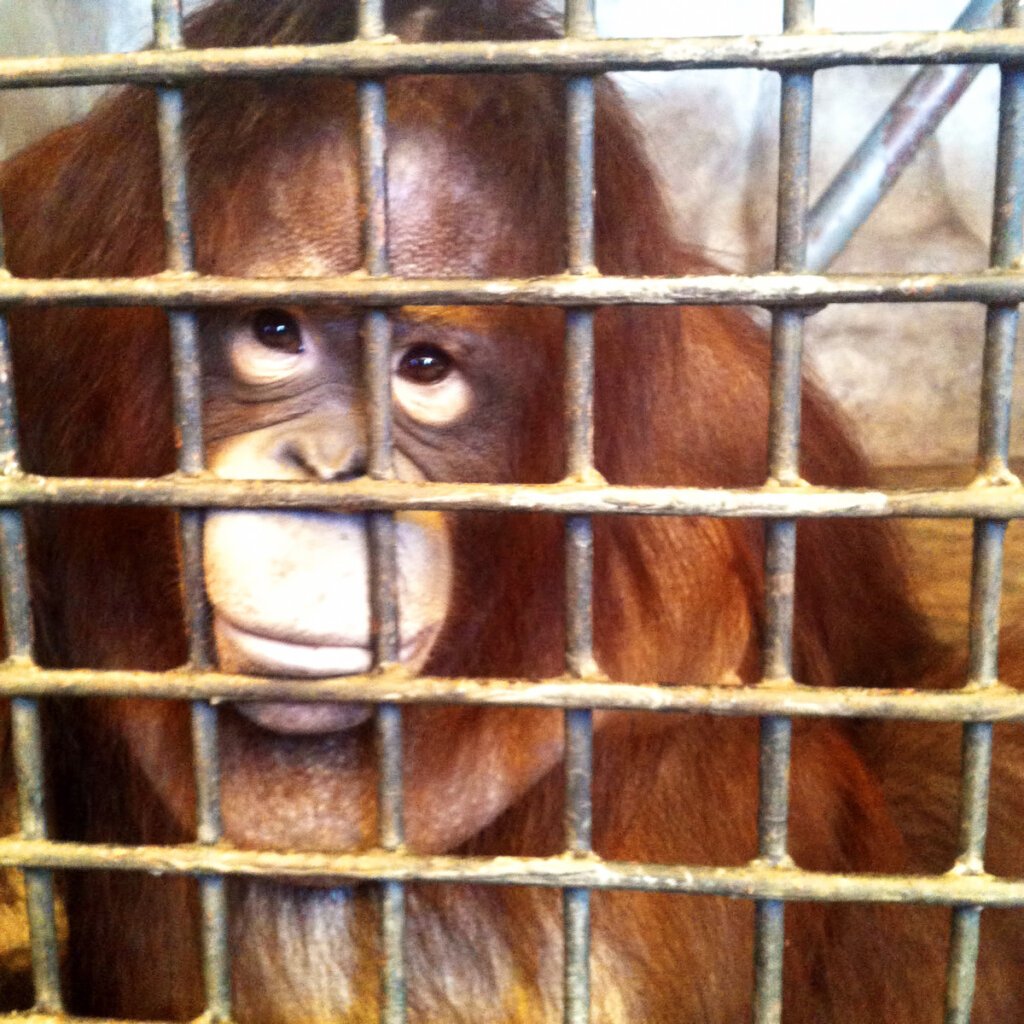
Live Export: ‘Shipping’s Modern Slave Trade’
Every year, millions of Australian sheep and cows are sent on hellish journeys to Southeast Asia and the Middle East – and the government fully supports this cruelty.

The terrified animals are crammed onto open-decked ships, many storeys high, for a gruelling trip across thousands of kilometres in all weather extremes. Many starve or succumb to heatstroke and disease.
Figures from the Department of Agriculture and Water Resources indicate that more than 2.5 million animals have died on live-export ships before reaching their destination, often from starvation – as they don’t recognise the pellets they’re given as food – or heat stress.
The fate of animals who survive the excruciating journey is little better: many are taken to filthy markets, where their throats are slit while they’re still conscious.
Such abuse is illegal in Australia.

Dr Lynn Simpson, one of Australia’s most experienced and respected live-export veterinarians, describes these practices as “shipping’s modern slave trade”:
I’d be doing a surgery such as an eye removal on a bull, kneeling inches deep in shit and urine as the ship rolled, and wonder if in the future this trade would be abolished like slavery and the world would look back in wonder and shame that it was ever considered acceptable.
On live-export ships, particularly during long journeys, animals may be forced to stand for a substantial period of time in a slurry of water, faeces, and urine up to 45 centimetres deep until they’re unloaded. On a number of vessels, faeces can fall from upper levels to the decks below, landing either on the animals or in their feed or water troughs. Cleaning is spasmodic, and thousands of tons of effluent are dumped overboard before arrival at the port.

Cramped conditions and inadequate ventilation combined with high temperatures and humidity lead to serious illness and mass deaths. In 2013, 4,000 sheep died on the Bader III – most of them in a single day – from heat stress. In 2016, 3,027 sheep died on a ship headed to the Middle East, and again in 2017, 2,400 sheep died on the infamous Awassi Express, mostly from heat stress. The live exporter behind the deadly voyage – Emanuel Exports – and two of its former directors were charged with cruelty to animals.
Rough seas are a significant problem, resulting in immeasurable suffering as well as fatalities. The smaller the vessel, the greater the risk that animals will be injured by its movements in heavy seas. The highest mortality rates for cattle on live-export ships in the last 20 years have been the result of turbulent waters and inclement weather. In some instances, up to 75% of the animals aboard have died.
A mortality rate of up to 2% of sheep and 1% of cattle during each live-export journey is considered “acceptable” by the Australian government.
These percentages may sound small, but the numbers soon add up. More than 200 million animals have been crammed onto filthy cargo ships over the last 30 years, and more than 2.5 million of them have died. And of course, every single one was an individual who felt fear and pain.
Government regulations mandate that deaths at sea must be reported, but no one can measure the enormous suffering endured by animals on these grim journeys.
Exposed Again and Again
PETA US first teamed up with Animals Australia to investigate the live-export industry in 2006. Since then, numerous exposés have revealed to the public how truly reprehensible this trade is, culminating in the release of video footage in 2018 on news program 60 Minutes showing exported sheep panting and heat-stricken, lying in piles of their own melting faeces and the decaying bodies of their flockmates. The footage prompted the government’s own review process, which found that conditions on board live-export ships to the Middle East from May to October routinely exceeded the heat-stress thresholds of Australian merino sheep.
Progress
From holding and attending protests to enlisting celebrities to lobby politicians to rallying supporters to send hundreds of thousands of e-mails to government officials, PETA has been speaking out against the horrors of live export for more than a decade – and things are changing for the better.
In 2020, the government announced that live-sheep exports will be banned to and through the Middle East from 1 June to 14 September. While the restrictions are a step in the right direction, such a ban falls short of even protecting sheep during the entire May to October period, which has been identified as being the most deadly.
What You Can Do
By taking the following actions, you can help prevent animals from suffering on live-export ships:
- Sheep used for their fleeces are often shipped to the Middle East for slaughter once they’re no longer profitable to the cruel wool trade. Don’t subsidise the live-export industry: never buy wool, and encourage family and friends to avoid it, too.
- Sign PETA’s action alert asking Australia’s federal Minister for Agriculture and Water Resources to end the live export of animals.
- Sign up for PETA Australia’s Activist Network so that you can stay informed about events and protests in your area.
- Share information about the cruelty of the live-export industry on Twitter, Facebook, and other social media sites.
- Write letters to your local newspaper or call in to radio stations to inform readers and listeners about what happens to animals who are shipped overseas. Check out this letter-writing guide to get started.
- PETA can provide leaflets that explain the cruelty of live export. Post them on community message boards, include one with every bill payment, or hold your own leafleting event or protest. Contact us to get a stash of leaflets or for more information.
Help Animals in 2025: Renew Your PETA Membership!




